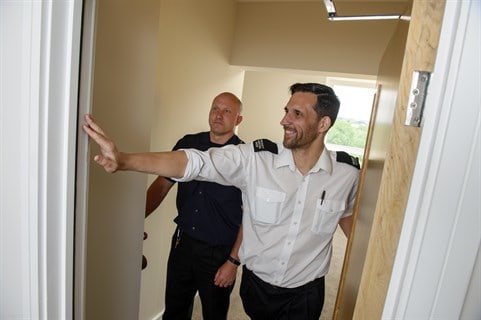
September marks the annual National Fire Chiefs Council’s Home Fire Safety Campaign. This month is split into four weeks, each focussing on one aspect of fire safety within the home or business.
The first week (31August to 6 September) focuses on Chimney Safety; the second on Business Safety (7 to 13 September); the third week focuses on Gas Safety (14 to 20 September) and the fourth and final week of September encourages Fire Door Safety (21 to 27 September).
James Whitton, West Hub Protection Manager said: “This month we are urging residents and business owners to take care in their homes and with their businesses. These last few months have been challenging for many, but we want you to know that our teams continue to be on hand to support you, and in return, we are asking our residents to help us to prevent incidents by following some simple steps.”
Chimney Fire Safety Week – 31 August to 6 September
Chimney Fire Safety Week aims to raise awareness of safe chimney use. Whilst chimney fires are not common, peak season for chimney fires is between January and March. It’s therefore important that residents know how to look after their chimneys beforehand.
Follow our top tips below on how to ensure that your chimney is kept in a safe condition:
- Employ a skilled and competent chimney engineer.
- Keep fire shafts clear, and make sure that your chimney is kept clean. A blocked chimney can cause carbon monoxide poisoning.
- Make sure you have a carbon monoxide alarm fitted and test it regularly.
- When buying a property, make sure that you have a full audit trail for appliances, components and a full fire risk assessment.
- Use a fire guard to protect from hot embers.
You can find information on local recommended chimney sweeps, installers, appliances and fuels on the HETAS (Heating Equipment Testing and Approval Scheme) website at www.hetas.co.uk.
Woodsure, the UK’s wood fuel accreditation scheme, also provides useful advice on the use of wood fuel. This can be found at www.woodsure.co.uk.
Business Safety Week – 7 to 13 September
Now that businesses are reopening with different safety measures aimed at reducing the spread of COVID-19, it is vital to consider the impact that these measures could have on your business’ fire safety.
To help your business reopen safely:
- Review your Fire Risk Assessment to make sure it’s still fit-for-purpose.
- Make sure that escape routes remain available and open correctly, and are not blocked by any temporary structures.
- Keep stock and waste securely stored.
- Do not let rubbish build up.
- Review waste collection arrangements.
- Ensure protective screens do not cover smoke detectors.
- Test your fire safety features that have been put in place regularly, like fire alarms, fire extinguishers and emergency lighting.
For more information, visit rbfrs.co.uk/coronavirusbusinesssafety
Gas Safety Week – 14 to 20 September
This year marks the 10th Gas Safety Week. This year, gas safety is particularly important, as many people, particularly those who have been shielding, may not have been able to access servicing for their appliances.
There are 23.2 million gas users in the UK. In the right hands gas is safe, but badly fitted and poorly serviced appliances can cause gas leaks, fires, explosions and carbon monoxide poisoning.
Some top tips to ensure that you’re kept gas safe include:
- Only using a Gas Safe registered engineer to fit and service your appliances. You can find and check an engineer at www.gassaferegister.co.uk or call 0800 408 5500.
- Checking both sides of your Gas Safe engineer’s Register ID card, to ensure that they are qualified to carry out the work you need doing.
- Have your appliances regularly serviced and safety checked every year.
- Know the signs of carbon monoxide poisoning: Headaches, dizziness, breathlessness, nausea, collapse and loss of consciousness.
- Check gas appliances for signs that they may not be working properly, like stains, yellow flames and excess condensation.
- Fit an audible carbon monoxide alarm in your home, ideally one on each level.
Further information can be found at www.gassafetyweek.co.uk.
Fire Door Safety Week – 21 to 27 September
As businesses begin to reopen, fire safety must remain a priority. With many businesses needed to adjust their layout with temporary structures and protective equipment, fire doors must not be an afterthought. Whilst propping open fire doors might seem to be a way of avoiding touching surfaces, this actually poses a significant danger in case of fire.
Follow our tips below to keep your fire doors working safely:
- Fire doors must remain closed, never propped or wedged open. Fire doors must be fitted with a certified automatic closing system linked to the fire alarm if they are to be open.
- Keep access and routes to fire doors clear and unobstructed – check how temporary structures impact your fire escape route plans.
- Ensure fire door signage is clearly visible.
- Wash your hands and clean fire doors regularly.
For more information on staying safe at home or at work, visit rbfrs.co.uk/your-safety.